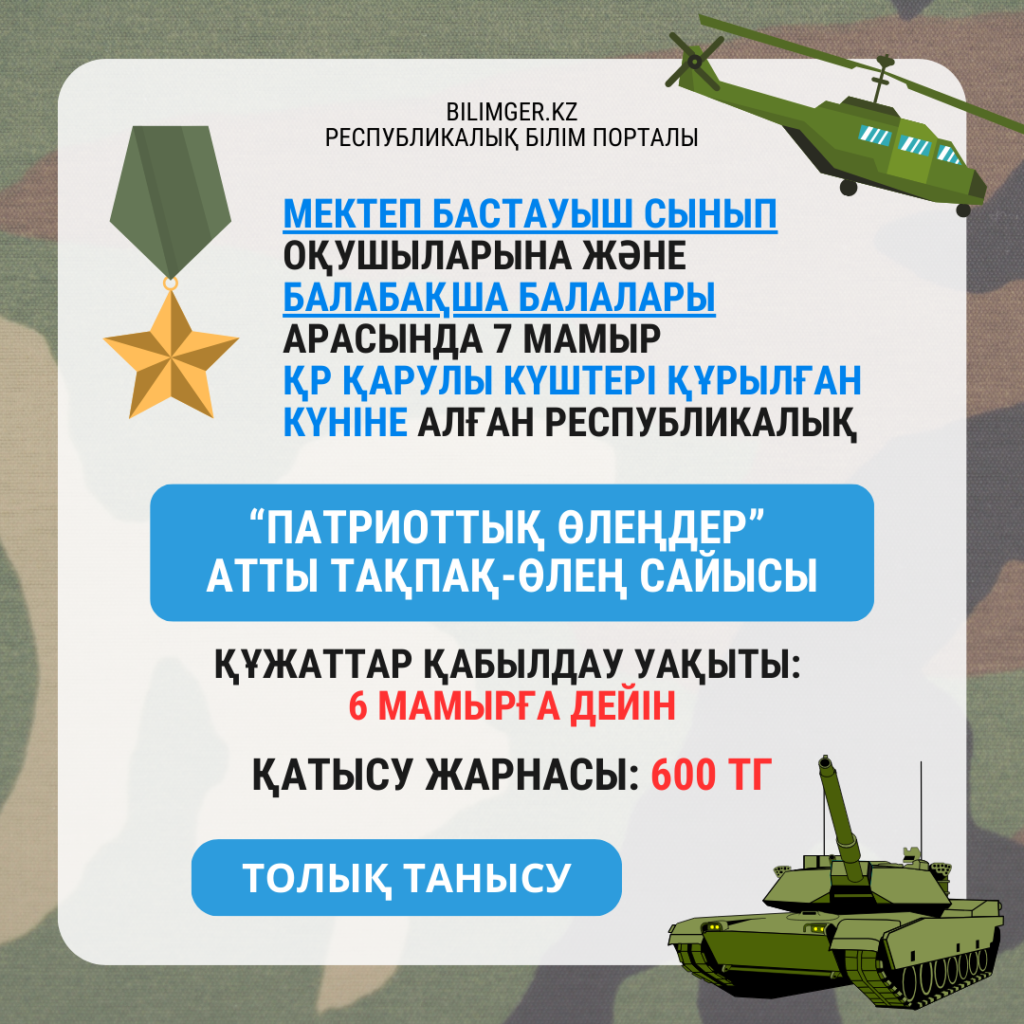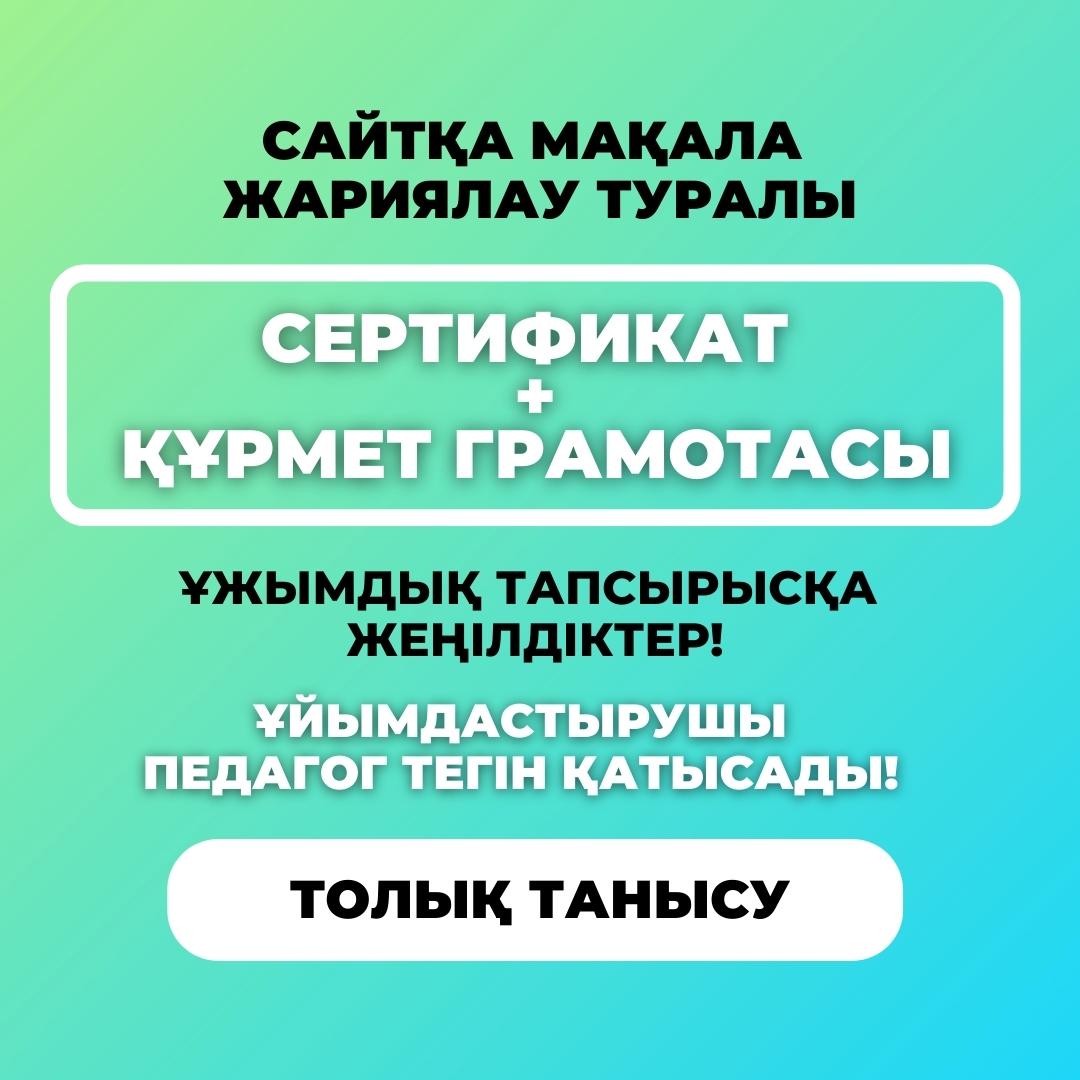LESSON: Module 4 Lesson 7 Grade 6. Types of films.
Kyzylorda region, Aral district
School – lyceum № 14 named after N. K. Krupskaya
English teacher
Yersaimov Murat Makhanbedievich
Lesson plan
| LESSON: Module 4 Lesson 7 | School – lyceum № 14 | |||||
| Date: | Teacher name: Yersaimov M.M. | |||||
| CLASS: 6 | Number present: | absent: | ||||
| Lesson title | Types of films. | |||||
| Learning objectives(s) that this lesson is contributing to | 6.3.2.1 ask simple questions to get information about a growing range of general topics
6.5.2.1 write with some support about real and imaginary past events, activities and experiences on a limited range of familiar general topics and some curricular topics |
|||||
| Lesson objectives | All learners will be able to:
use simple questions to get information about a growing range of a given tasks with support; understand with some support about real and imaginary past events, activities and experiences on a limited range of a given tasks with support; |
|||||
| Most learners will be able to:
understand simple questions to get information about a growing range of a given tasks with support; apply with some support about real and imaginary past events, activities and experiences on a limited range of a given tasks with support; |
||||||
| Some learners will be able to:
identifywith some support about real and imaginary past events, activities and experiences on a limited range of a given task without support; discuss with some support about real and imaginary past events, activities and experiences on a limited range of given tasks without support; |
||||||
| Assessment criteria | Identify the main ideas in extended talk with some support
Provide a point of view in conversations and discussions Retell extended stories and episodes on a given topic |
|||||
| Values links | “MangilikYel” though education content | |||||
| Cross-curricular links | Geography, Kazakh languages | |||||
| Previous learning | Past Continuous p.44
Past Simple vs Past Continuous |
|||||
| Plan | ||||||
| Planned timings | Planned activities | Resources | ||||
| Beginning the lesson
7min
10 min
|
(W) Introducing learning and lesson objectives
(G)Warm up: Work with duties. Organization moment: Greeting. Teacher: Good morning, students. How do you do? How’s your day? It’s nice to meet you. And you? My name is Mr. Murat. And your names? Now we’ll watch some episode of film.
It is difficult nowadays to think about our life without cinema. It became a very popular entertainment since more than a hundred years ago. Lumiere brothers shot their first three — minute film about a train arrival to the railway station. The movie was shown to public in December 1895. First films had no sound and were black-and-white. Later colours and sound were added into films. People of different professions are involved in modern cinema production.
Teacher: Now we’ll watch some episodes of different films: I’ll ask questions and you’ll give your answers.
Do you like to watch films? Where do you like to watch them on TV or you like to go to the cinema? With whom do you prefer to watch films with your parents or with your friends? How many films do you watch a week? What was the name of the first film? Who is your favourite actor or actress? Teacher: Dividing into groups: divides learners into 2 groups with chocolate. 1st group Historical film 2nd group Comedy film
Құман Тастанбеков, Асанәлі Әшімов, Меруерт Өтекешова, Әмина Өмірзақова, Нұрлан Сегізбаев, Асылхан Төлепов, Аян Өтепберген, Леонардо Ди Каприо, Кейт Уинслет, Маколей Калкин Answer the questions:
1. Do you watch films? 2. Do you know these actors and actress? 3. What are the names of these actors and actress? 3. What are the names of these films? 4. Do you watch Kazakh or American films?
(P/G)Presentation: Introducing with the new words:
|
SB p. 46-47 Cards, pictures of historical figures
SB p. 46-47 Cards, pictures of historical Figures
|
||||
| Main
Activities 10min
10min
|
Task 1. Students listen to the words and identify what topic they belong to?
Fantasy — фантастикалық Action/adventure — шытырман оқиғалы фильм; Historical — тарихи Science-fiction-ғылыми — фантастикалық; Western — батыс фильмдері; Comedy — комедия; Animated — анимацияланған ; Horror — қорқынышты; Descriptor: a learner: finds and matches the pictures. To play a game: “Kill a fly” Adjectives connected with films:
To present new vocabulary • Play the recording with pauses for Ss to repeat chorally and/or individually. • Pay attention to Ss’ pronunciation and intonation. b) To talk about types of films; to practise using adjectives • Explain the task and read out the example. • Have Ss discuss their favourite types of films in pairs following the example dialogue. Monitor the activity around the class. Task 2.Pair work: discuss their favourite types of films in pairs following the example dialogue, to practiсe using adjectives: exciting, funny, clever, fast, interesting, boring, scary, violent. Suggested Answer Key A: I like horror films because they are really scary. B: Really? I prefer fantasy films because they are exciting and clever. Descriptor: Gives an information about films he/she likes. Gives an information about films he/she doesn`t like. Differentiated task Task 4. Individual work. 1. Find the types in the grid below. a) comedy b) historical c) western d) animated e) actionf) horror
Task 5. Group work. Read the text KYZ-ZHIBEK. Students read the text, find the missing words on the spot. A great poem about love. Sultan Khodzhikov’s film is one of the best examples of the Kazakh epic about love, created according to a folk legend. This is an epic painting, spectacular, beautiful. The authors of the film very accurately reproduced the life of that distant era, folk customs of the Kazakhs, up to national costumes. Bekezhan-the main villain and rival of Tulegen, in the beautiful performance of Asanali Ashimov, is a very bright character, charismatic and daring, irresistible and insidious. And the meeting of lovers … Probably the most memorable shots in the film. All this is shown poetically, in a romantic spirit. Koeman Tastanbekov and Meruert Utekesheva are an ideal couple. They played well. Descriptor: — read the text — find the missing words from the text |
|||||
| Ending the lesson
3 min
|
Feedback “Five fingers”
Learners talk about what they can do after the lesson. Which task did you like the most? What was easy for you? What was difficult for you? Show on your fingers your opinion about the lesson. Reflection through “Five fingers” 1 finger – difficulties during the lesson. 2 finger – what do you like during the lesson 3 finger – your mood (көңіл күй) 4 finger – what do you learn today? 5 finger – wish to the teacher |
||
| Additional information | |||
| Differentiation – how do you plan to give more support? How do you plan to challenge the more able
learners? |
Assessment – how are you planning to check learners’ learning? | Cross-curricular links Health and safety check ICT links
Values links |
|
| support weaker learners by modelling for them as they prepare to talk about their writers to ensure they have two or three things to say guide strong learners to give more expansive answers in presenting writers e.g. tell us about their
family |
check comprehension of listening and reading text through follow-up questions | Cross-curricular links: Writers of different countries | |
| Reflection Were the lesson objectives/learning objectives realistic? Did I stick to timings?
What changes did I make from my plan and why? |
Answer the most relevant questions from the box on the left about your lesson. | ||




